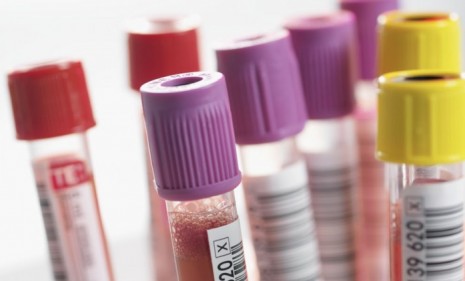A blood test that could save us from cancer
Researchers are getting closer to unveiling a new blood test for cancer. What is all the excitement about?

A free daily email with the biggest news stories of the day – and the best features from TheWeek.com
You are now subscribed
Your newsletter sign-up was successful
A potentially game-changing cancer test took a big step closer to the doctor's office on Monday, after researchers at Boston's Massachusetts General Hospital announced a five-year commercialization deal with two Johnson & Johnson subsidiaries, Veridex and Ortho Biotech Oncology. The blood test promises to let doctors detect even one cancer cell among a billion healthy ones. Could this revolutionize cancer treatment? (Watch an AP report about the research)
What does the new test do?
It allows doctors to trap and count circulating tumor cells (CTCs) — cancer cells that break off from tumors and float in small numbers though the bloodstream — by just drawing small amounts of blood. The blood is passed over a grooved microchip with CTC-attracting antibodies. It's "like a liquid biopsy," says Dr. Daniel Haber, one of the test's inventors.
The Week
Escape your echo chamber. Get the facts behind the news, plus analysis from multiple perspectives.

Sign up for The Week's Free Newsletters
From our morning news briefing to a weekly Good News Newsletter, get the best of The Week delivered directly to your inbox.
From our morning news briefing to a weekly Good News Newsletter, get the best of The Week delivered directly to your inbox.
What are the advantages of a "liquid biopsy"?
The hope is that this blood test will replace more invasive and dangerous cancer tests, like normal biopsies, mammograms, and colonoscopies, and yield more useful results within hours, not weeks. Instead of doing a biopsy, starting treatment, and looking for improvements two months later via CT scan — the common treatment now — doctors will be able to monitor treatments on a daily basis, and make adjustments accordingly. Being able to study the cancer cells will also help doctors determine how best to treat each patient's disease.
Where does Johnson & Johnson come in?
Veridex and Ortho will take the Mass General prototype and try to improve on it. One of their jobs will be making it viable for mass production and use. They will also help guide the test through the regulatory approval process. "We're limited by our ability to make it fast, easy, cheap, and something that could be done on a global scale," says Haber. Currently, each chip costs about $500.
A free daily email with the biggest news stories of the day – and the best features from TheWeek.com
How optimistic should we be?
"This is one of the most exciting developments in cancer research in the past decade," says Dr. Manny Alvarez in Fox News. Still, cancer specialists warn that it will be years before the test hits the market, and nobody is quite sure how significant CTCs are. They may help spread cancer from one organ to another, and they may indicate the severity of cancer cases, says Dr. Jay Brooks at Ochsner Health Systems in Baton Rouge, La. But if that's not the case, the tests "may be detecting things that don't have clinical significance."
Sources: AP/Yahoo, Boston Globe, CNN, Fox News, BusinessWeek/HealthDay